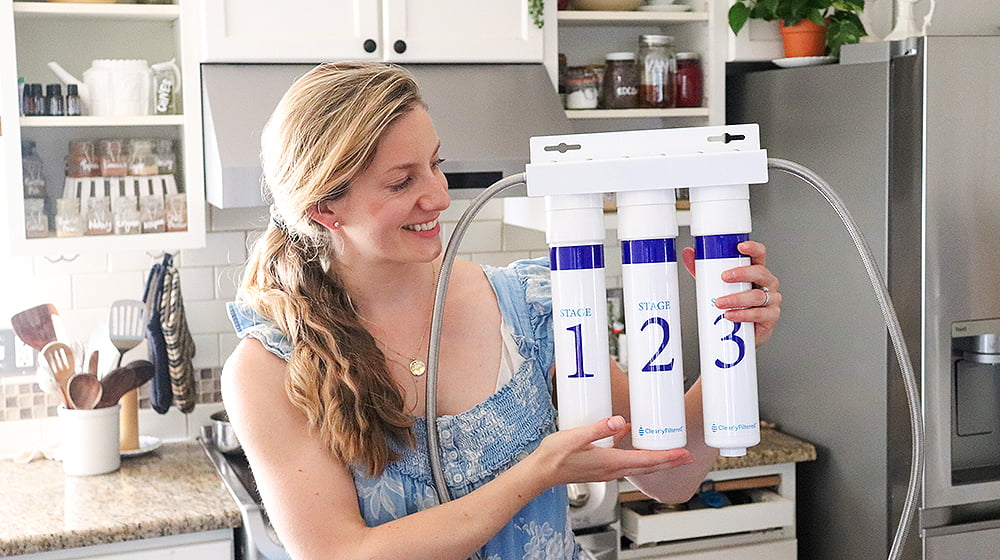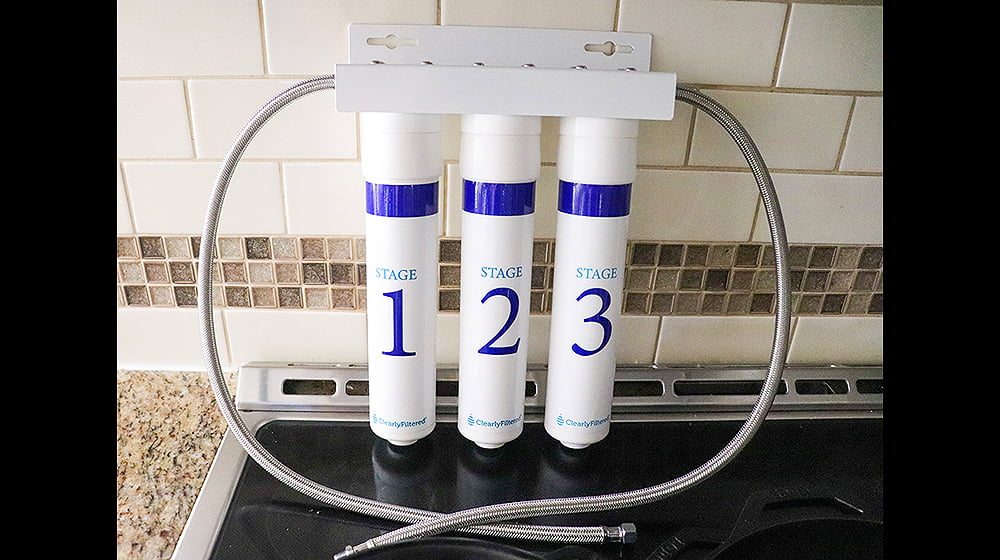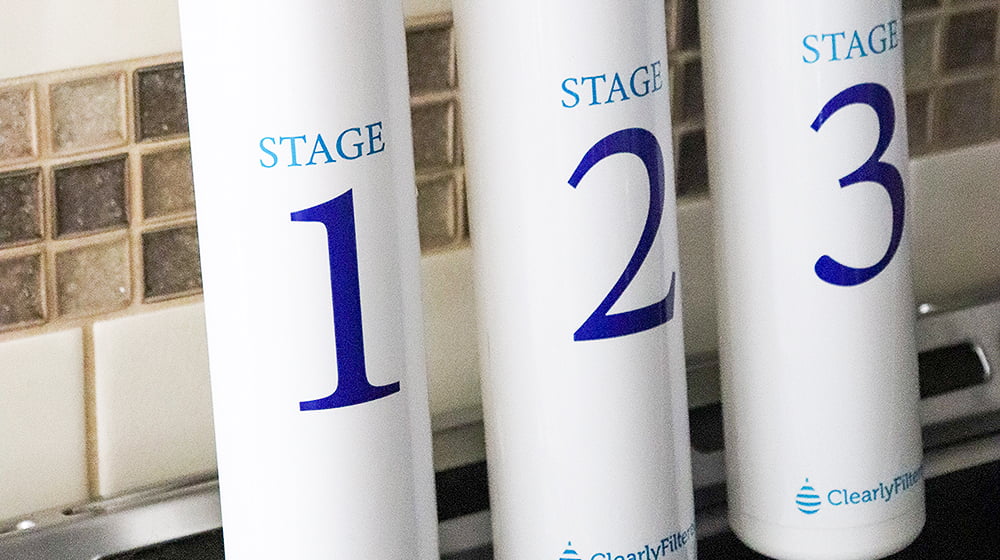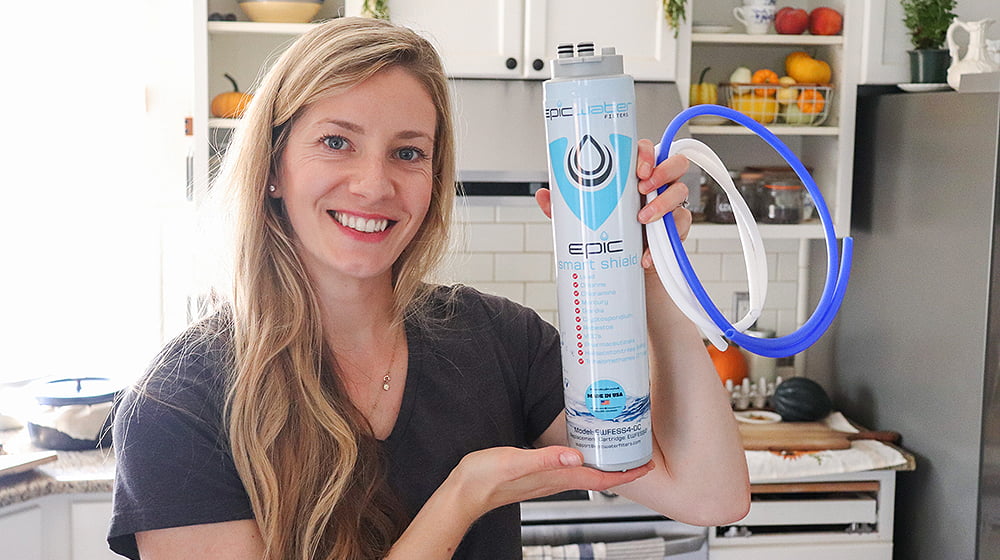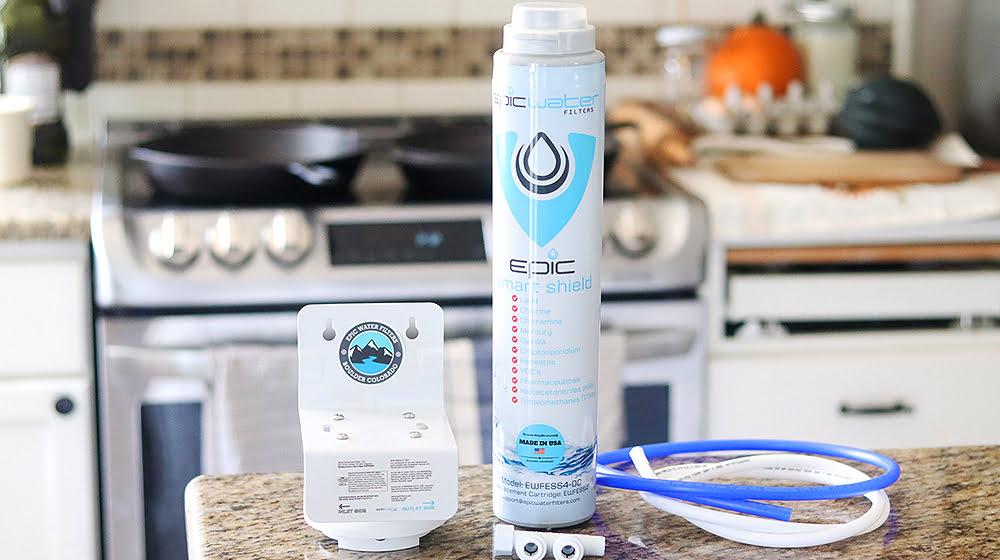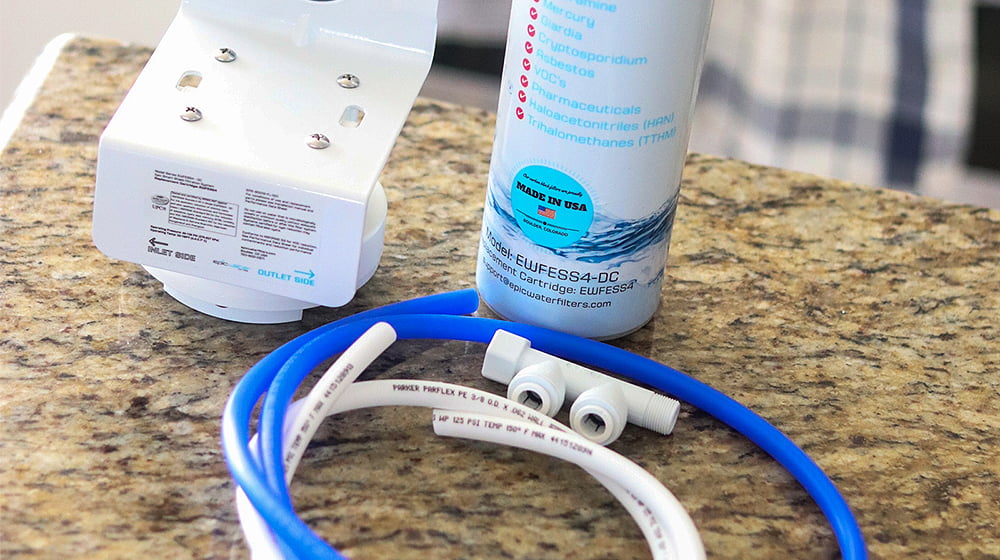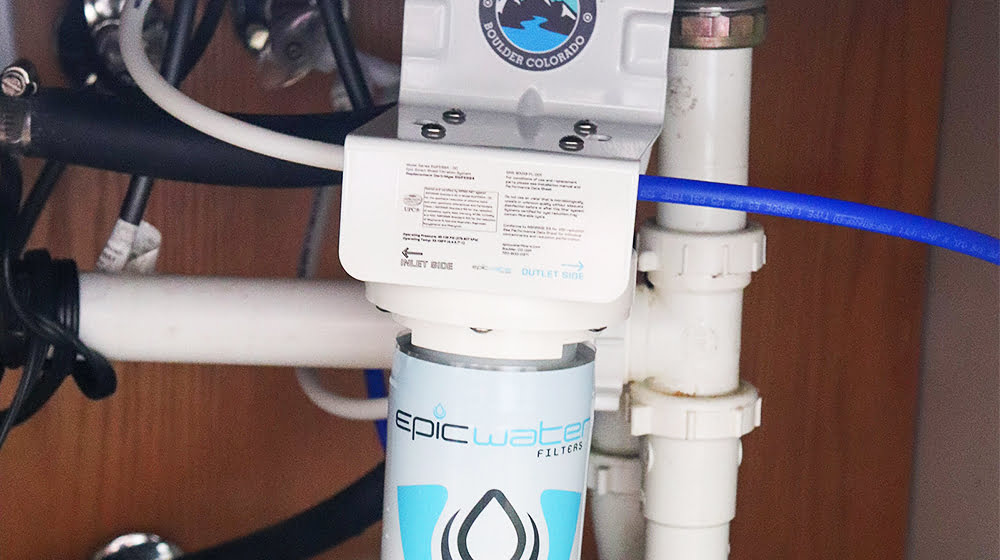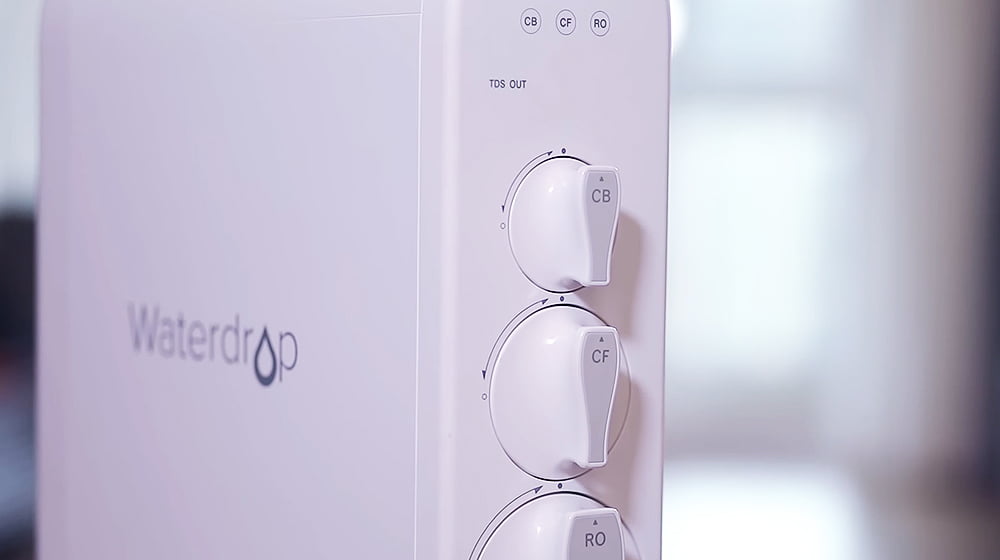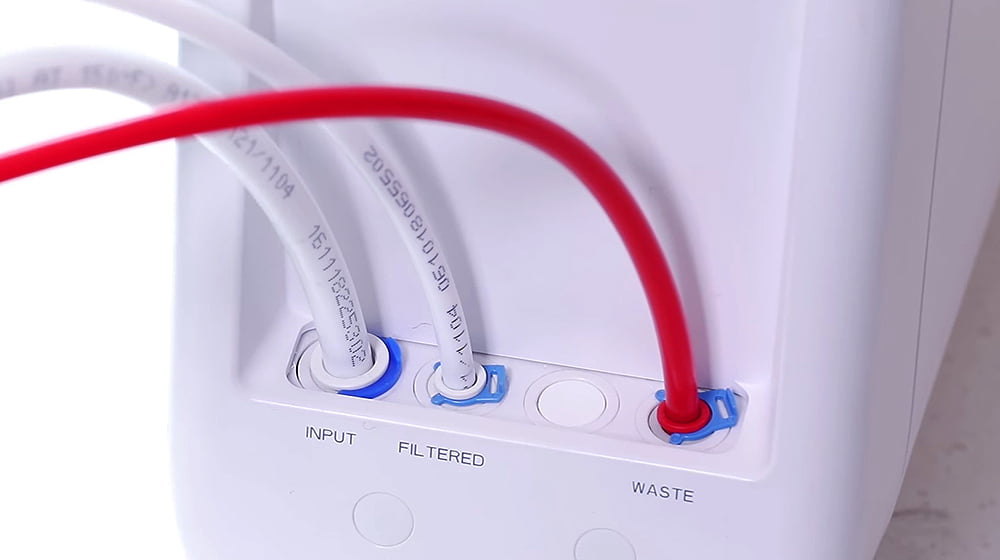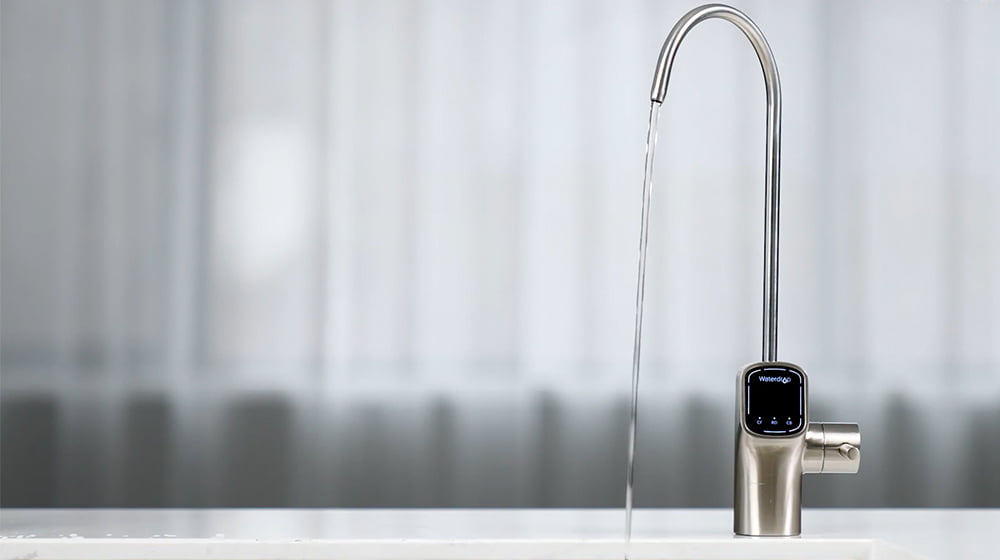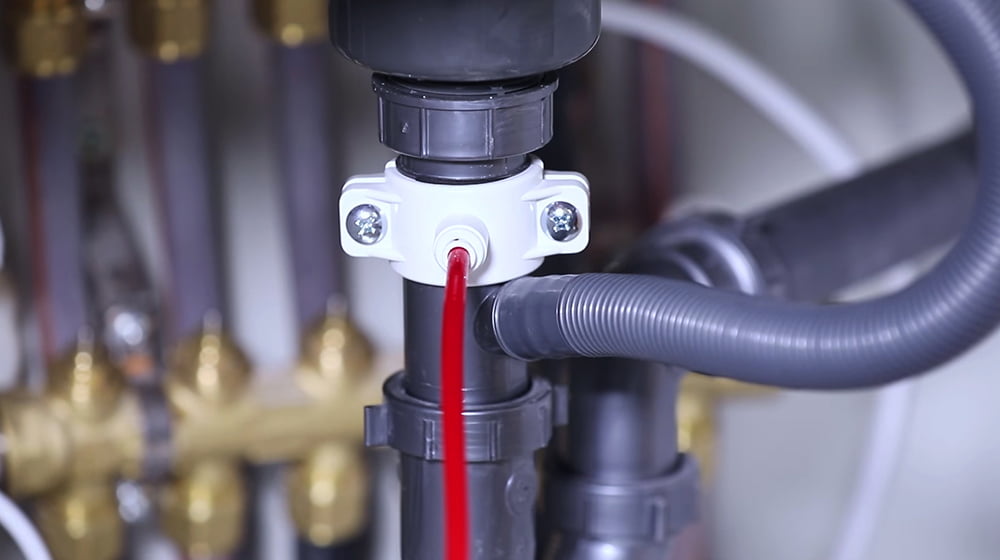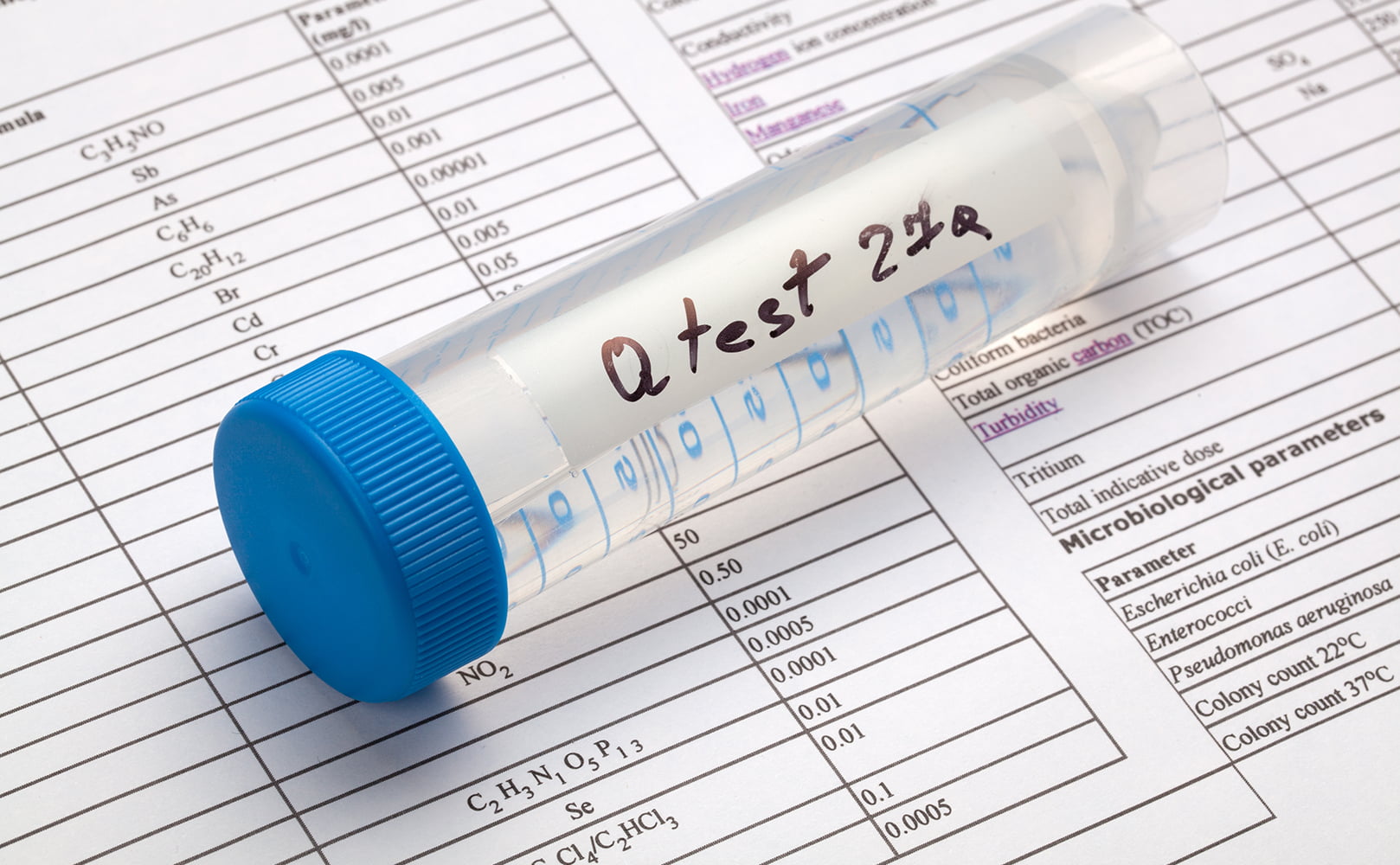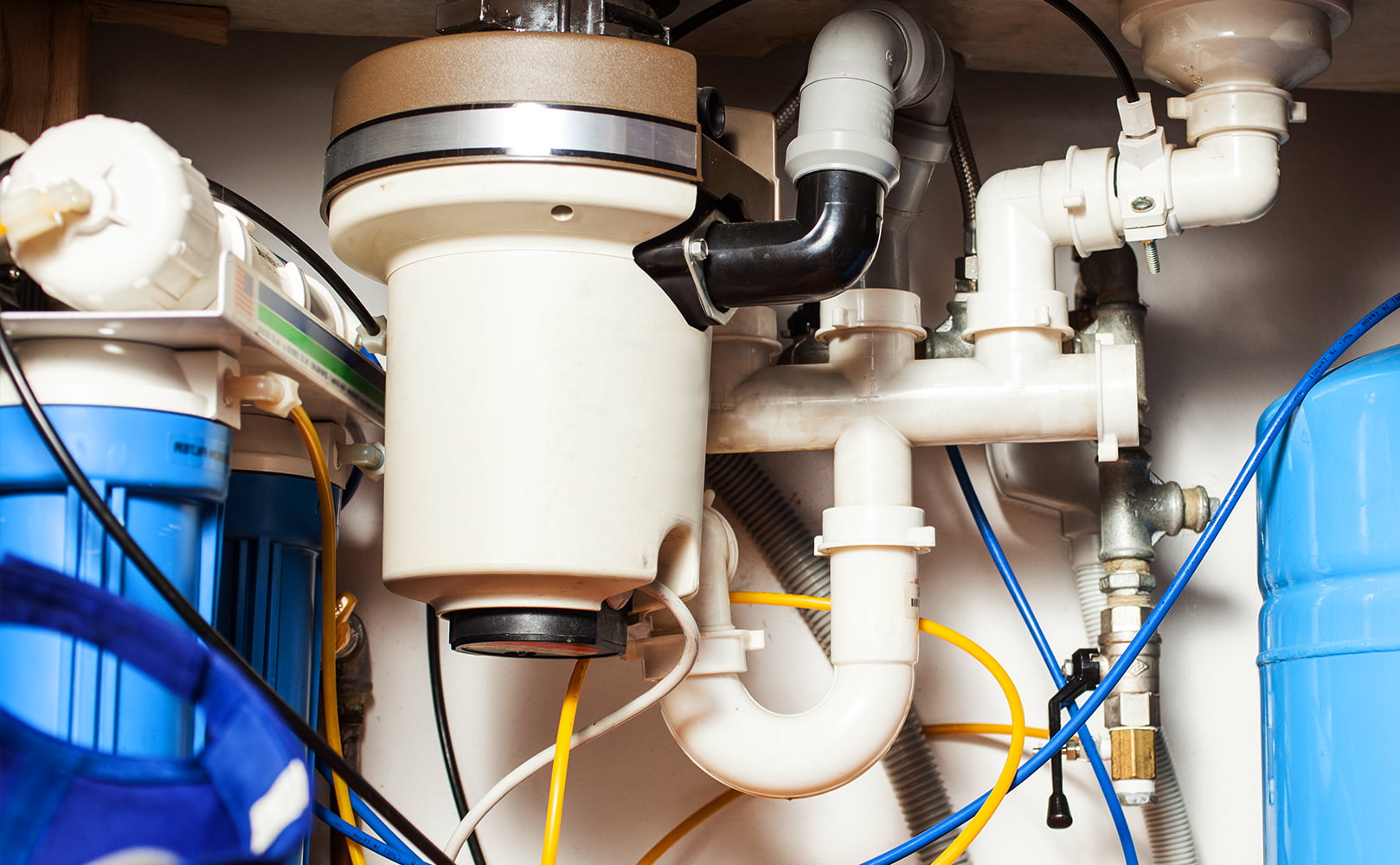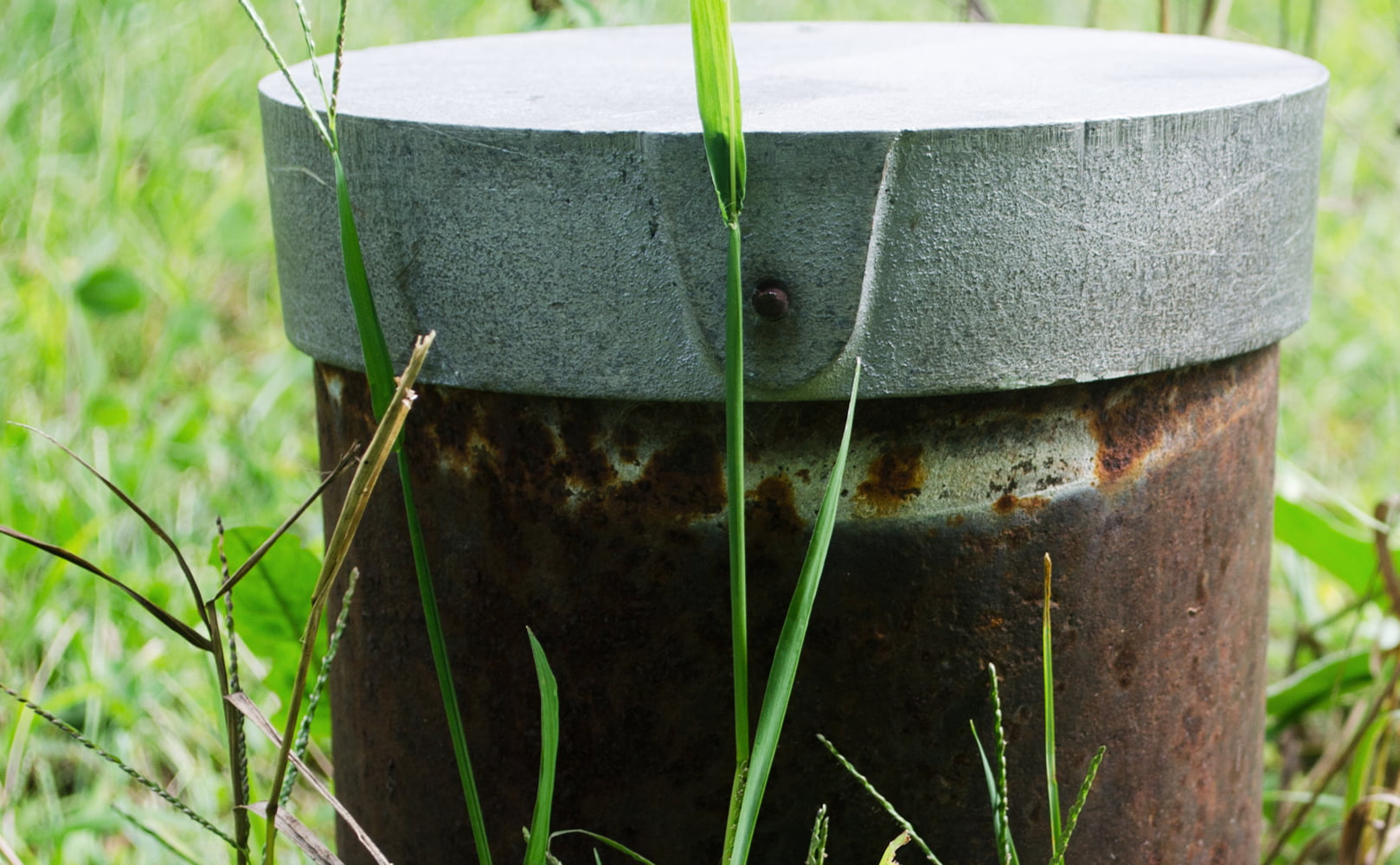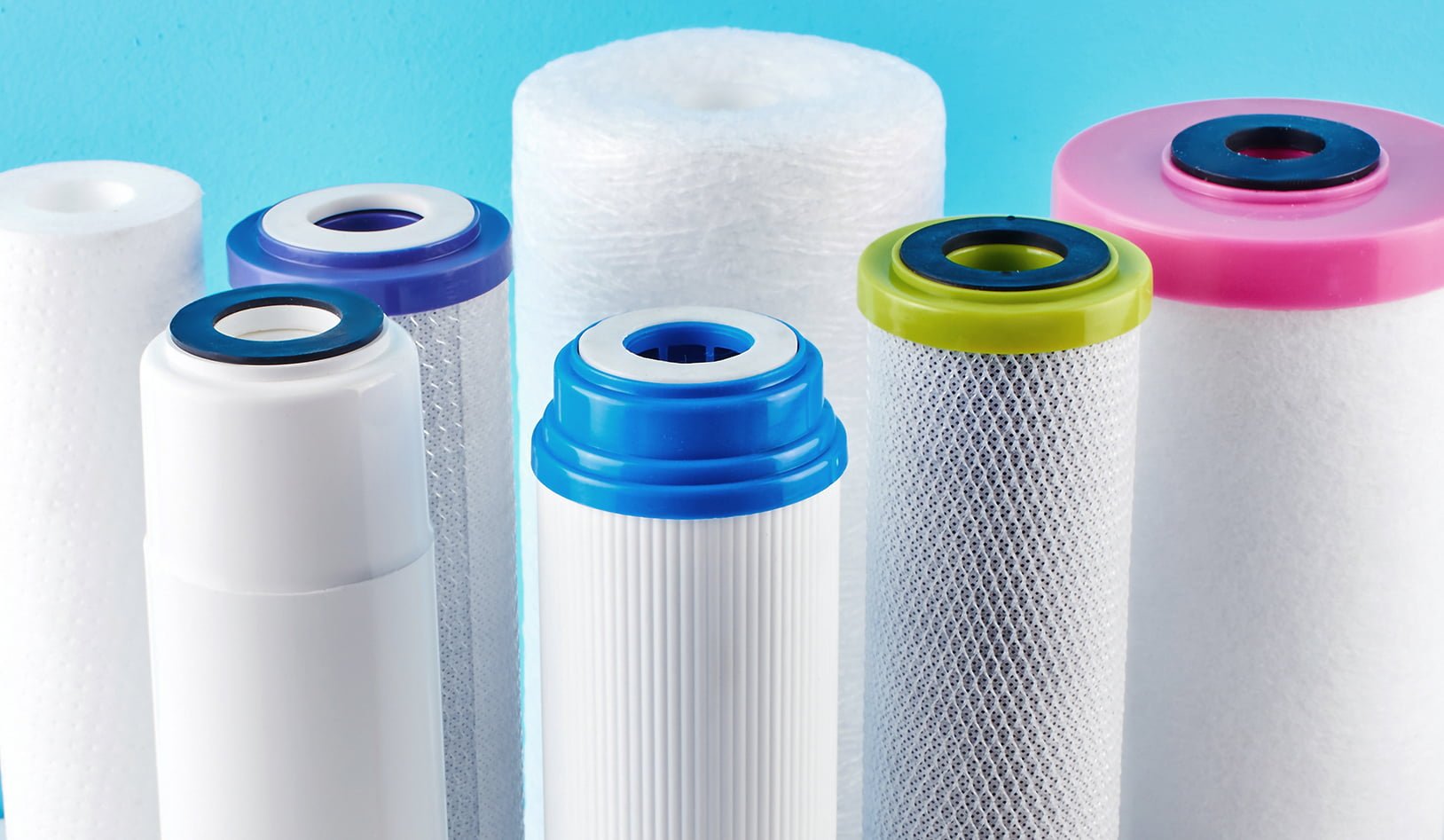5 Best Under Sink Water Filters for Well Water (*Update 2024)
Written by: Gene Fitzgerald // Expert Fact-Checking: Buddhini Dolapihilla, MBSS // Last Updated: Jan 31, 2024
This page may contain affiliate links. If you buy a product or service through such a link we earn a commission at no extra cost to you. Learn more.
Top Pick: What’s the Best Under Sink Water Filter for Well Water?
The best under sink water filter for well water in 2024 is the Clearly Filtered 3-Stage. It is NSF-tested to remove 232+ contaminants, very easy to install and maintain, durable, backed by a lifetime warranty and 30-day satisfaction guarantee, and it has a long filter life of 2,000 gallons.
Finding the right under sink water filter for well water can be a daunting task due to the abundance of options available – and many flakes. It’s also important to choose a system that effectively addresses the specific challenges associated with your well.
To simplify your decision-making process, we have conducted an extensive evaluation of over 20 top-rated systems. Our research, testing, and comparison efforts have been ongoing since December 3, 2021, and we continuously update and refine our guide to ensure the most accurate information.
No Time to Read? Check Our List of the Best Under Sink Water Filters for Well Water!
| Model | Details | |
|---|---|---|
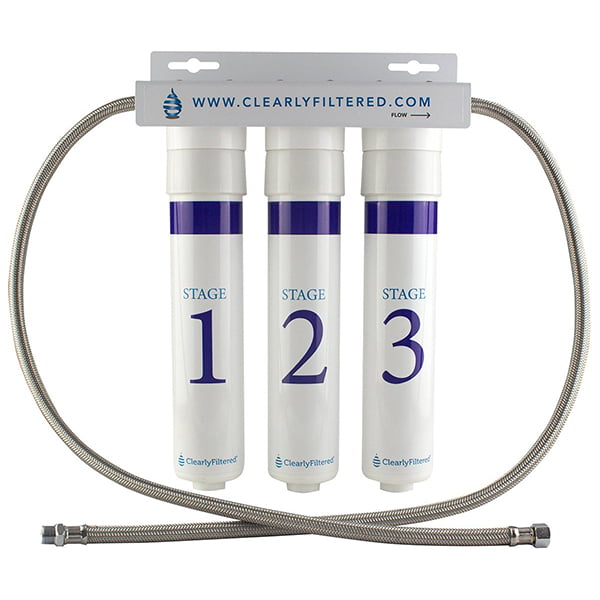 Best Overall: Clearly Filtered 3-Stage |
Overall Rating: 5.0/5.0 ⓘRatings based on effectiveness of filtration, NSF/ANSI standards, life of filter cartridges, cost, our own testing, 3rd party user ratings, product warranty and support, and other factors.
Get 10% Off! Use Code: |
Price: $$$ Type: 3-Stage Under Sink Filter, Inline Filter Life: 2,000 gal Testing & Certs: NSF 42, 53, 401 Annual Cost: $440 Read Review: Click Alexa’s Video Review: Click |
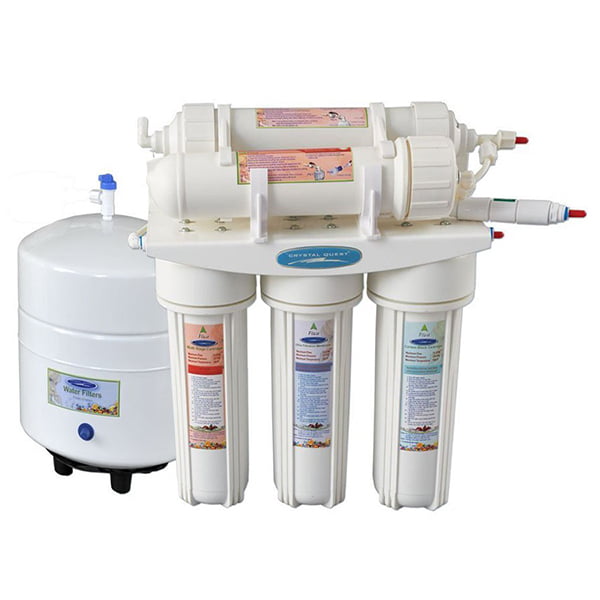 Best for RO Purification of Well Water: Crystal Quest 1000C |
Overall Rating: 4.5/5.0 ⓘRatings based on effectiveness of filtration, NSF/ANSI standards, life of filter cartridges, cost, our own testing, 3rd party user ratings, product warranty and support, and other factors.
Get 5% Off! Use Code: |
Price: $$ Type: Reverse Osmosis Filter Life: Varies Testing & Certs: – Annual Cost: ~$100-155 Read Review: Click |
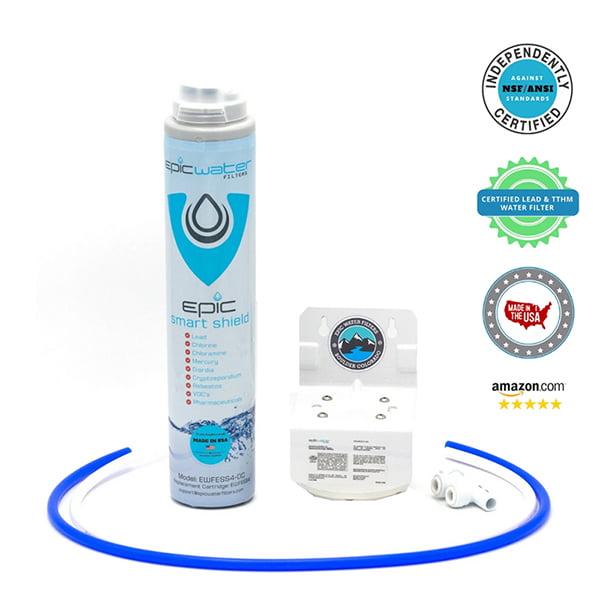 Best Budget Option: Epic Smart Shield |
Overall Rating: 4.5/5.0 ⓘRatings based on effectiveness of filtration, NSF/ANSI standards, life of filter cartridges, cost, our own testing, 3rd party user ratings, product warranty and support, and other factors.
Get 20% Off! Use Code: |
Price: $ Type: One Stage, Inline Filter Life: 651 gal Testing & Certs: NSF 42, 53, 401 Annual Cost: $115 Read Review: Click Alexa’s Video Review: Click |
Under Sink Well Water Filter Reviews
Our Top Picks
- Clearly Filtered 3-Stage Inline System – Best Overall
- Crystal Quest 1000C & 1000CP Under Sink Systems – Best for RO Purification of Well Water
- Epic Smart Shield Inline Water Filter – Best Budget Option
- Aquasana OptimH2O – Runner-Up Reverse Osmosis System
- Waterdrop G3 Tankless RO – Best for Tankless RO Purification
1. Our Top Pick: Clearly Filtered 3-Stage
In our opinion, the best under sink water filter for well water in 2024 is the Clearly Filtered 3-Stage. In fact, it is one of the top filtration systems you will ever find. Why?
It is mainly because an independent lab has tested this unit to eliminate 200+ contaminants, such as heavy metals, bacteria, viruses, and all sorts of chemicals commonly found in well water.
Besides, the unit is super user-friendly. Its maintenance and installation are easy, too, Thus, many customers use and recommend the under sink water filter to their friends and family.
Want to know more?

Clearly Filtered 3-Stage Under Sink Well Water Filtration System |
|
| Price: | $$$ |
| Filter Type: | Inline |
| Filtration Capacity: | 2,000 gal |
| Testing: | NSF 42, 53, 401 |
| Annually: | $440 |
|
Overall Rating: 5.0/5.0 ⓘRatings based on effectiveness of filtration, NSF/ANSI standards, life of filter cartridges, cost, our own testing, 3rd party user ratings, product warranty and support, and other factors.
Get 10% Off! Use Code: |
|
Alexa’s Video Review
As part of the BOS team, Alexa has installed and tested the Clearly Filtered Under-the-Sink Water Filter System in her own home and with her own hands. She has used the system for several weeks to gather genuine first-hand experience. And most importantly, Alexa has documented the entire process, including her findings and personal opinion, in the video below:
Other Specs
- Model: 3-Stage Under the Sink Water Filter System
- Last Price: $550
- Filter Media: Carbon + Proprietary Blend
- Filter Stages: 3
- WxHxD: 15″x15.4″x3.1″
- Fitting: ⅜”
- Warranty: Lifetime (Limited)
Key Features & Pros
- Manufactured in America.
- The Clearly Filtered under sink water filter follows a 3-stage filtration process. The first stage is granular activated carbon media to eliminate 98.6% of chlorine, organic compounds, and different other chemicals – think pesticides – that might change the smell and taste of your well water.
- The second stage uses a special blend of filter media for the heavy lifting. This involves reducing metals such as 99.4% chromium 6 and different radiological elements.
- In the last stage, the water filter system eliminates contaminants including 94.3% arsenic and fluoride.
- The best part of this unit is that it is NSF-tested for standards 401, 53, and 42 for more than 230 contaminants found in city and well water supplies. Filtration effectiveness guaranteed!
- System doesn’t eliminate healthy minerals, which means you are not deprived of essential nutrients.
- Inline design means you can use your existing kitchen faucet.
- It is one of the most durable filters for well water. The premium quality of outlet hoses and the stainless steel structure of the inlet will make the unit last for a long time.
- Quick to install and doesn’t require much maintenance. Moreover, perfect for renters as the non-invasive setup takes a maximum of 15 minutes to adjust, and you can also easily remove it as required.
- You can change the filters without any complicated tools once a year. Filtration capacity is 2,000 gallons which is plenty of water for 365 days.
- With a 30-day free trial policy, you can return the under sink system and get all your money back.
- Since the Clearly Filtered 3-Stage filter comes with a limited lifetime warranty, you don’t have to pay anything for repairs.
Cons
- In case your well water is overly dirty (best measured in TDS), you probably need additional pre-filtration such as a sediment filter.
- You might experience up to 35% drop in the overall water pressure. This isn’t too troublesome if you ask us.
- As compared to most other under sink filter units, the Clearly Filtered is more expensive. But that’s because it exhibits excellent quality and is made by using advanced manufacturing techniques and filter media.
- The replacement filters for this unit are also quite costly. However, you can avail of the free shipping and discount offer after subscribing to the VIP Program of Clearly Filtered.
Our Rating
- Filtration Performance: 5.0/5.0
- Filter Life: 5.0/5.0
- Price: 4.0/5.0
- Maintenance Cost: 4.5/5.0
- Overall: 5.0/5.0
Best for
The Clearly Filtered 3-Stage is best for people who want a compact, easy to install and use, and very effective under sink well water filter.
2. Best for Reverse Osmosis Purification: Crystal Quest 1000C & 1000CP Under Sink Well Water Filters
If you use well water to quench your thirst and cook, the Crystal Quest 1000C & 1000CP may strike your fancy. Both under sink water filtration systems are designed specifically for well water. However, they aren’t NSF-tested unlike the above option and so came in second.
By the way, the units are completely identical except that the 1000CP uses an electric pump to increase water pressure. This provides for faster filtration and reduces wastewater.
Other than that, we have 12 different filter stages which can conveniently eliminate all the contaminants that might be present in your well water.
Moreover, if you want to kill 99.9% of all microorganisms infesting your water, you can install a 13th filter stage on any of the 2 systems to convert the Quest 1000C and 1000CP into the 3000C and 3000CP, respectively.
Other Specs
- Model: 1000C
- Last Price: $298.40
- Filter Media: 5-Micron Carbon Block, UF Membrane, GAC, Ion Exchange Resin, KDF, RO, GAC, Sediment Filter Pads
- Filter Stages: 12
- Flow Rate: 0.03 gpm
- Membrane Rating: 50 gpd
- WxHxD: 16″x21″x8″
- Tank: 11″x15″x11″, 3.2 gal
- Water Temperature: 40-85 °F
- Operating Pressure: 30-60 psi
- Warranty: 1 Year
Key Features & Pros
- The 12 filtration stages help remove different water disinfectants (great if you shock your well occasionally), herbicides, pesticides, sediments, microorganisms, PCBs, VOCs, industrial solvents, heavy metals, hardness, and any unnatural taste and odor.
- In the first stage, an activated carbon block absorbs chemicals and chlorine. In addition, it traps any undissolved substances to prevent fouling of the rest of the system.
- Then the second stage involves a 0.02-micron ultrafiltration membrane that reduces the percentage of large organics and microorganisms in your well water.
- The fourth filter stage is granular activated carbon that removes different chemicals and 99% of chlorine smell and taste.
- Filter stage 5 is an ion exchange resin that targets water hardness and metals.
- Stages 6 and 7 feature Eagle Redox Alloy filter media to remove chromium 6, sulfur, mercury, and iron among other metals. The media also hinders bacterial growth.
- Stage 9 of the filtration process is an RO membrane which effectively rejects any contaminants bigger than 0.0001 microns.
- Finally, the 11th filter stage is another GAC filter to eradicate residual taste.
- Filter stages 3, 8, 10, and 12 are filter pads that block suspended particles.
- Stage 13 is optional. It’s a UV filter used to inactivate microbes.
- Both under sink well water filtration systems produce adequate safe water for a big family.
- Require standard installation that all under sink filter units demand.
- There is very limited maintenance cost involved. Besides, if you subscribe, you can gain 5% off the total cost of any filter replacements.
- We have a limited one-year warranty.
Cons
- One customer reported the installation instructions are not very detailed.
- The absence of NSF testing is a bummer.
- These filters can clog if the iron content in your well water is more than 2 ppm. Similarly, the hardness of the water shouldn’t be more than 15 grains in every gallon to avoid pressure loss.
Our Rating
- Filtration Performance: 4.0/5.0
- Filter Life: 5.0/5.0
- Price: 5.0/5.0
- Maintenance Cost: 4.5/5.0
- Overall: 4.5/5.0
Best for
These Crystal Quest systems are best for heavily contaminated well water.
3. Best Budget Option: Epic Smart Shield Inline Under Sink Water Filter
If you are looking for a quality under sink filter on a restricted budget, the Epic Smart Shield is quite amazing in treating your well water. The system is a non-RO unit that can remove more than 70 contaminants such as asbestos, lead, chlorine, E. Coli, and cyst.
Besides, the good news is that this filter is NSF-certified.

Epic Smart Shield Under Sink Water Filter |
|
| Price: | $ |
| Filter: | Inline |
| Filtration Capacity: | 651 gal |
| Certifications: | NSF 42, 53, 401 |
| Annually: | $115 |
|
Overall Rating: 4.5/5.0 ⓘRatings based on effectiveness of filtration, NSF/ANSI standards, life of filter cartridges, cost, our own testing, 3rd party user ratings, product warranty and support, and other factors.
Get 20% Off! Use Code: |
|
Alexa’s Video Review
Being an integral member of the BOS team, Alexa has ordered and tested the Epic Smart Shield Under Sink Water Filter at home. She shares her hands-on experience of installing and using the system in the video below:
Other Specs
- Model: Epic Smart Shield
- Last Price: $135.00
- Filter Media: Carbon Block
- Flow Rate: 1.25 gpm
- WxHxD: 4.25″x19.75″x4.5″
- Water Temperature: 33-100 °F
- Operating Pressure: 40-120 psi
- Warranty: Lifetime
Key Features & Pros
- If you are on a tight budget, this filter will make a great option to consider.
- Every component is made in America.
- The Epic Smart Shield under sink filter system isn’t specifically designed for well water. Since you are a well water user, the manufacturer recommends you use their 5-micron sediment filter for pre-treatment to increase the filter life of the main system.
- As stated above, the unit can remove more than 70 potential well water contaminants. It uses an activated coconut shell-based carbon block to achieve this.
- NSF-certified for standards 401, 53, and 42. This means the system can remove 95.5% of chlorine odor and taste, 95.5% of chloramine, 99.3% of lead, 99.9% cyst, and a great percentage of mercury, VOCs, and asbestos – among other stuff.
- The under counter water filter is also tested against reduction of PFOA + PFOS, E. Coli + Pseudomonas Aeruginosa, several radiological elements, and microplastics.
- You won’t have to hire an expert installer thanks to the quick-connect fittings and inline design. Moreover, you will get an installation kit, so you don’t have to arrange any essential tools or components. DIY ready!
- You can also purchase an extra faucet regardless of the inline design.
- Filtration capacity is 651 gallons or 12 months, whichever comes first, for lowest maintenance requirements.
- The maintenance cost for each cartridge is $115. Furthermore, to benefit from a 20% discount on your replacement filters, you can subscribe to the Clean Water Club.
- Epic Water Filters believes in recycling. You can get a new filter for free in return for three old ones.
- If you are a new owner, you will appreciate the company’s customer support. The staff provides exceptional service that makes the installation and maintenance process even more convenient.
- 100% lifetime warranty and return policy.
Cons
- Some users have reported a water pressure drop because the average flow rate is 1.25 gpm. This might be a problem for some, but most of you will find this insignificant.
Our Rating
- Filtration Performance: 4.5/5.0
- Filter Life: 4.0/5.0
- Price: 5.0/5.0
- Maintenance Cost: 5.0/5.0
- Overall: 4.5/5.0
Best for
The Epic Smart Shield is by far the best budget under sink water filter for well water.
4. Runner-Up Under Sink RO System: Aquasana OptimH2O
If you are looking for an effective under sink reverse osmosis system to treat your well water, the Aquasana OptimH2O is also worth the consideration. Aside from removing different harmful substances from water, it adds back all the healthy minerals lost during the filtration process; minerals that you might require for your daily nutritional intake.
Of course, that’s quite unlike a traditional RO under sink filter, and that’s the best thing about the Aquasana OptimH2O. The remineralization process proves quite beneficial in improving your water’s taste and balancing its pH value, too.
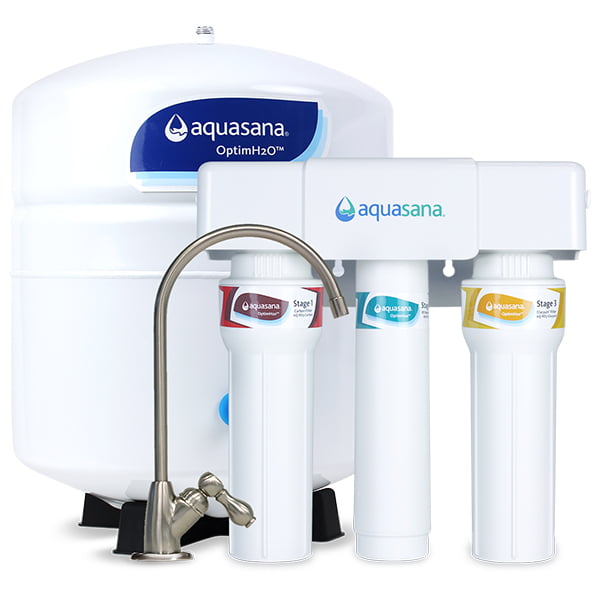
Aquasana OptimH2O Under Counter RO Water Filtration System |
|
| Price: | $$ |
| Filter Type: | RO System, Dedicated Faucet |
| Filtration Capacity: | 365 Gallons |
| Certifications: | NSF 42, 53, 58, 401, P473 |
| Annually: | ~$240 |
|
Overall Rating: 4.5/5.0 ⓘRatings based on effectiveness of filtration, NSF/ANSI standards, life of filter cartridges, cost, our own testing, 3rd party user ratings, product warranty and support, and other factors.
|
|
Other Specs
- Model: OptimH2O
- Filter Media: Activated Carbon, RO Membrane, Activated + Catalytic Carbon + Ion Exchange Resin, Remineralization
- Filter Stages: 4
- Membrane Rating: 35 gpd
- Recovery Rate: 29.43%
- WxHxD (System): 12″x12.5″x4.5″
- Tank: 11″x16″x11″, 3.2 gal
- Water Temperature: 40-100 °F
- Operating Pressure: 40-100 psi
- Warranty: 2 Years
Key Features & Pros
- Uses a 3-stage filtration process, with the first one involving activated carbon media to adsorb larger particles and chemicals like chlorine.
- As the water gets treated for the above contaminants, it enters the second stage, passing through the reverse osmosis membrane, which rejects all heavy metals, salts, microorganisms, and much more.
- Finally, a combination of catalytic and activated carbon + ion exchange resin (this is called the Claryum filter), removes pesticides, heavy metals, remaining water disinfectants, and anything else that’s left in the water.
- The Aquasana OptimH2O also features a remineralizer that adds back all the beneficial minerals in your water removed by the RO process.
- The filter system has NSF certifications that prove its effectiveness in the removal of 97.66% chloramines and chlorine, 99.3% lead, 97.6% arsenic 5, 97% chromium 6, 95.7% fluoride, and so on and so forth. Tested standards are 53, 58, 42, 401, and P473.
- The under sink water filtration system is available in three faucet designs: Oil-rubbed bronze, brushed nickel, and chrome.
- You can conveniently install everything yourself without paying a professional. The package contains all parts and step-by-step instructions. Besides, if you feel any hurdles, Aquasana’s support service will be more than ready to assist you.
- For your peace of mind and satisfaction, the filter comes with a 90-day guarantee.
- Finally, the Aquasana OptimH2O comes with a 2-year warranty.
Cons
- Unfortunately, some customers have complained of overall poor quality and unexpected leakages.
- The flow rate is rather slow.
- Since this is a reverse osmosis system lacking a pump, you will get lots of wastewater.
- Maintenance is quite quick and straightforward. But replacement cost of the filters can vary at around $240, depending on the quality of water and your usage, which is more on the expensive side.
- You can join the subscription program for all types of discounts to reduce the overall cost.
Our Rating
- Filtration Performance: 5.0/5.0
- Filter Life: 4.5/5.0
- Price: 4.0/5.0
- Maintenance Cost: 4.0/5.0
- Overall: 4.5/5.0
Best for
The Aquasana OptimH2O is best for people who want an NSF-certified under sink RO system for guaranteed contaminant removal that also applies remineralization.
5. Best for Under the Sink (Tankless): Waterdrop G3
Do you have limited space under your kitchen sink? If yes, consider buying a tankless under sink water filter for your well, like the Waterdrop G3, to overcome this problem.
Although this is an RO system, it doesn’t require a storage tank. Instead, the Waterdrop G3 works on demand. How? With the help of a built-in water pressure pump.
Moreover, this filter has a robust design, an effective RO membrane, installation is quick, and it can reduce many contaminants present in well water. All these great factors make this unit worth a 4-star from our side.

Waterdrop Tankless Under Sink RO Filter System |
|
| Price: | $$$ |
| Filter Type: | RO System, Own Faucet |
| Filtration Capacity: | 550-2,200 gal |
| Certifications: | NSF 58, 372 |
| Annually: | ~$145 |
|
Overall Rating: 4.0/5.0 ⓘRatings based on effectiveness of filtration, NSF/ANSI standards, life of filter cartridges, cost, our own testing, 3rd party user ratings, product warranty and support, and other factors.
Get 10% Off! Use Code: |
|
Alexa’s Video Review
Being part of the BOS team, Alexa has ordered and tested the Waterdrop G3 Reverse Osmosis System, which means she has installed the system with her own hands and used it for several weeks for some genuine first-hand experience! Alexa has documented the entire process, including her findings and personal verdict, in the video provided below:
Other Specs
- Model: G3P600
- Last Price: $539.00
- Filter Media: Sediment, 2x Carbon Block, RO Membrane
- Filter Stages: 4
- Flow Rate: 0.42 gpm
- Membrane Rating: 600 gpd
- Recovery Rate: 66%
- WxHxD: 5.67″x17.72″x18.12″
- Water Temperature: 41-100 °F
- Operating Pressure: 14.5-87 psi
- Warranty: 1 Year
Key Features & Pros
- The space-saving design without a tank makes this under sink water filter system a perfect choice for people living in small accommodations.
- It features four filter stages, with the first stage being a composite filter that removes sediments and chlorine.
- The composite filter is a combination of activated carbon and sediment filter media.
- The second stage is the RO membrane which effectively rejects the vast majority of contaminants and impurities as they are found in well water: Heavy metals, metalloids, salts, minerals – you name it.
- Finally, the activated carbon block post-filter is the last stage that kicks out leftover chemicals and reduces any residual taste.
- The Waterdrop G3 tankless filter is NSF 58-certified to reject Total Dissolved Solids (TDS).
- A built-in pump produces high pressure and a flow rate of 0.42 gpm. Thus, you can easily fill a cup within 8 seconds.
- The unit also produces only .67 gallon of wastewater for one gallon filtered. This sounds like a lot but it’s pretty solid for an RO system.
- For your safety, the manufacturer has only used BPA-free materials.
- If this is your first time buying a filtration system, don’t panic. The Waterdrop G3 system demands a relatively simple installation that most DIY people can easily handle.
- The hassle-free filter replacements are also a plus point. The average maintenance cost is just around $145, which is not too expensive.
- There is a TDS meter built within this system. It measures and displays the TDS levels, and if you find them going up, it’s the right time to change filters.
- The smart LEDs on the faucet shows your filter’s status. White light represents good status, yellow light means fewer than 40 gallons of filtered water remaining. If you see red light you need to replace filters immediately.
- The 30-day money-back guarantee is enough to test this under sink filter. And if you do not find its performance worthy, you can get all your money back.
- 1-year warranty period.
Cons
- Regardless of its high performance and top-class features, the system costs more than most other under sink reverse osmosis water filters available in the market.
- We only have 1 NSF certification for 1 analyte.
- Some customers have complained about the TDS meter not showing correct values. This is probably related to TDS creep.
Our Rating
- Filtration Performance: 4.0/5.0
- Filter Life: 5.0/5.0
- Price: 3.5/5.0
- Maintenance Cost: 4.0/5.0
- Overall: 4.0/5.0
Best for
The Waterdrop G3 is best for people who want a tankless RO system for their well water supply.
- The Best Under Sink Water Filter System Reviews
- The Best Rated Under Sink Alkaline Filters Reviewed
- Best Tankless Under Sink Water Filter
- What Are the Best Whole House Well Water Filtration Systems?
- Gravity Water Filter System Reviews 2024
- Reviews of the Best Iron Filter (for Well Water)
- What’s the Best Sediment Filter for Well Water?
- Best Inline Water Filters for Well Water
- The Best Carbon Filters for Well Water
- List with All Under Sink Water Filters Featured on BOS
Comparison List
(Mobile Hint: Swipe to Scroll)
| Model | Price | Type | Filter Process | Filter Stages | Capacity | NSF | Annually | Warranty | Additional Info |
|---|---|---|---|---|---|---|---|---|---|
| Clearly Filtered | $$$ | Inline | Carbon + Proprietary Blend | 3 | 2,000 gal | 42, 53, 401 | $440 | Limited Lifetime | |
| Crystal Quest 1000C & 1000CP | $$ | RO | 5-Micron Carbon Block, UF Membrane, Granular Activated Carbon, Ion Exchange, KDF, RO, GAC, Filter Pads | 12 | Varies | – | ~$100-155 | 1 Year | |
| Epic Smart Shield | $ | Inline | Activated Carbon Block | 1 | 651 gal | 42, 53, 401 | $115 | Lifetime | |
| Aquasana OptimH2O | $$ | RO | Activated Carbon, RO Membrane, Activated + Catalytic Carbon + Ion Exchange Resin, Remineralization | 4 | 365 gal | 42, 53, 58, 401, P473 | ~$240 | 2 Years | |
| Waterdrop G3 | $$$ | RO | Sediment + Carbon Block Composite, RO, Carbon Block | 4 | 550-2,200 gal | 58, 372 | ~$145 | 1 Year |
Buying Guide: How to Choose the Under-the-Sink Well Water Filter That’s Best for You
The following are key features worth considering when shopping for an under sink well water filter. They will help you choose the right on for your needs and budget.
Testing the Water Quality
Undoubtedly well water is great, mainly because it’s free and also because there’s lots of it. However, if your water comes from a private well on your property, you need to make a little more effort to make it suitable for drinking.
Most importantly, you must get your well water tested annually since the chemical properties can change over time. A well water test will point out potential issues with bacteria and other microorganisms or contaminants like nitrate and iron. Only be knowing your water quality in the first place can you decide on the right method(s) of treatment.
Pre-Treatment
Most of the time, you can’t just install a filter under your kitchen sink and run raw well water through it. Not only could the water contain dangerous and disease-causing pathogens, it may also be laden with sediment, iron, hardness minerals or other impurities that would clog any point-of-use water filtration system immediately.
Remember: Compared to city water, well water has never seen the insides of any water utility.
In other words, pre-treatment is often required. This could mean shock-chlorinating your well once every 6 months or installing a whole house sediment pre-filter. In fact, that’s exactly what most private well owners choose to do – installing a whole house water filter removing sediments and other dirt to prevent buildup in the plumbing system and water-based appliances.
Unless you have a sediment whole house filter, you will have to look for an under sink system with a robust sediment filter stage (preferably with a pleated surface) to remove most sediment before it clogs subsequent filters.
The same principle applies for other contaminants like those mentioned above.
NSF/ANSI Certifications
As a consumer, NSF certifications are the easiest way to gauge a water filter’s ability to remove contaminants. Therefore, when comparing multiple models, styles, or brands, make it a point to select the one which is NSF-certified to ensure all claims are valid. Why is that so?
NSF is an independent organization that tests and certifies products for food and health safety based on strict benchmarks. When shopping for an under sink well water filter, you must look for these NSF certifications:
- NSF Standard 42 (Aesthetic Effects): This standard tests a water filter’s ability to remove contaminants that alter the taste and smell of water.
- NSF Standard 53 (Health Effects): NSF 53 addresses contaminants posing a serious health threat, such as cryptosporidium, giardia, lead, and volatile organic chemicals (VOCs).
- NSF 58 (Reverse Osmosis): Similar to NSF Standard 53 but for reverse osmosis systems only.
- NSF Standard P231 (Microbiological Filtration): You must look for this one, especially when using well water. It certifies that a filter reduces certain bacteria, viruses, and cysts.
- NSF Standard 401 (Incidental Contamination/Emerging Compounds): Under sink water filters that can remove herbicides, pesticides, pharmaceutical run-offs, prescription drugs, or chemical compounds like BPA receive this certification.
Filtration Method
Depending on your water test report, you can select an under sink water filter system with any of these technologies:
- Activated Carbon: First and foremost, a carbon-based under sink filter removes all sorts of chemicals. It helps in improving the taste and smell of your water.
- Iron Filter: Your well water contains iron? A dedicated iron filter is an excellent choice here.
- Reverse Osmosis: Under sink RO systems can flush out thousands of contaminants from your water by pushing it through a very fine semi-permeable membrane. With proper pre-filtration, RO systems are prioritized for well water treatment since they make the water safe for use.
- UV Light: A UV light stage is essential to deal with microbiological contamination such as bacteria.
- In addition, there are plenty of other types of under sink water filtration systems and filtering methods to choose from.
Filter Stages
The ideal under sink filter will have multiple levels of filtration to provide you with clean drinking water.
The general principle states the more filter stages a system has, the better the quality of the output water will be.
Although more stages ensure thorough filtration, it means your water flow could be affected. Speaking of…
Water Pressure and Flow Rate
Flow rate refers to how much water flows out of any given faucet or filter in a set time span. In contrast, water pressure refers to how quickly and with what force water is dispensed.
Most residential wells are equipped with pressure tanks that control the water pressure as it flows from the well to your home. Since under sink water filters rely on water pressure to work, you must ensure your house has around 60 psi.
Besides decreasing the flow rate and pressure on your faucet, poor home water pressure can also result in poor filtration.
What’s more, it’s important to note that faucets without any filter attached can supply water at the rate of roughly 1.5-2.0 gpm. However, no water filter can match that raw flow rate.
Typically, systems that use a dedicated faucet have a flow rate ranging from 0.5 to 1.5 gpm. And single-stage under sink filtration units will provide you with better water pressure compared to multi-stage systems.
Ease of Installation
You can install an under sink well water filter all by yourself, provided you are not “tool-challenged”. For all others, hiring a pro is the right way to go.
If you are going with a pro, we advise always taking opinions from two plumbers. Many oblivious homeowners end up paying a fortune for a job that could be done quickly in under an hour. Expect to pay $200 for your under sink filter installation.
With that said, under sink systems that come with dedicated faucets cost more to install. Nevertheless, we recommend getting one if possible so you can use unfiltered water for washing vegetables/fruits and doing the dishes. This means your filter will last longer, and you will notice a reduction in annual maintenance costs.
Ease of Maintenance
Always look for an under sink water filter system that is easy to maintain. Since you will be replacing filters every six months, you must get a unit that has easy-to-change cartridges. It’s no fun spending an entire day with your water filter when it’s due for a replacement.
Besides saving time, an easy-to-maintain filter will save you from paying exorbitant service costs if you are not handy around the house.
Filter Capacity and Costs
If you compare the various models of under sink water filters available on the market, you will notice most of them need replacements every six months to a year. While it’s a game-changer compared to faucet filters, you might still be interested in a system that can go as long as possible before filters reach the end of their capacity.
Most cartridges perform the same way; therefore, a longer service life indicates better construction and high-quality materials. Of course, you can expect to pay more for an under sink water filter that lasts longer.
When shopping, it’s wise to estimate the total average filter replacement cost per year. If you buy a low-cost unit that needs expensive cartridge replacements every few months or so, you’ll incur high annual costs later on.
Space Requirements
Most under sink filtration systems will fit easily inside any cabinet. But if you are short of space, you must look for one that takes as little room as possible.
Needless to say, simple inline filters occupy less space than multi-stage or reverse osmosis systems.
Your Budget
Last but not the least; consider your budget before making a purchase. In the case of under counter water filtration systems, the most expensive one is not always the best (true for many products). This is because they often come with additional features that you might not need.
Thankfully, there are so many models on the market. So, you can easily find one that fits your wallet. For example, a simple undersink water filter can cost as low as $80, while some heavy-duty ones can come in at around $500.
More on Under Sink Water Filters for Well Water
What Is an Under Sink Water Filter for Well Water?
An under sink water filter is a point-of-use system that delivers filtered water on demand.
That said, there are almost no systems designed for private well water specifically. That’s why we recommend using a regular under sink water filter in conjunction with pre-filtration.
This is because water from a private well can be high in sediment, iron, scale, and more. Highly sedimented water, for example, will choke any under sink filter instantaneously – thus it needs prior treatment.
Types of Under Sink Filters for Well Water
Here are a few types of under sink water filters that you can choose from if you use water from a private well.
Inline and Dedicated Faucet
An inline under sink water filter will connect your filter directly to the cold water tap on your sink. While the idea of a single faucet sounds appealing and convenient, you don’t need filtered water to do your dishes or wash your vegetables, do you?
This is why some under counter water filters are equipped with a separate faucet. Setting up a dedicated dispenser helps minimize the wastage of precious filtered water. Moreover, it means your filter cartridges will last longer.
Single-Stage Units
These simple devices employ only one filter element. But it’s not necessarily a bad thing!
Suppose the water from your private well is microbiologically safe, and you are already using a whole house water filter for sediment, then a simple carbon under sink filter could be a great option.
Conventional Multi-Stage Systems
Most conventional under sink water filters feature multiple stages of filtration. Some have two, while other sophisticated systems have 5 or more stages.
Reverse Osmosis
A reverse osmosis system is one of the best options for people using water from a private well (with pre-filtration!). RO treats your water down to a molecular level.
The bad news is that RO filters remove the good guys, along with the bad ones. So basically, your water is devoid of healthy nutrients and minerals needed by your body. Secondly, RO systems are not exactly eco-friendly. Without a pump, 3 to 4 gallons of water are flushed down the drain for every gallon filtered.
Pros and Cons of Installing an Under Sink Well Water Filtration System
An under sink well water filtration system can help you in more ways than one. Here is what we love, plus the limitations of these units.
Pros
- An under counter well water filter will bring about a noticeable improvement in the flavor and smell of your water.
- By removing harmful contaminants, it will make your water safe to use. Your family will be shielded from hundreds of diseases, and you can expect a better quality of life.
- In comparison to whole house water filters, these units are relatively budget-friendly. You don’t need to pay an arm and a leg to ensure clean drinking water.
- Since you don’t need to replace filter cartridges more than twice a year, maintenance is easy. In contrast, most water filter pitchers and faucet filters have shorter average life spans and may need replacements up to 6 times a year.
- Filtered water on demand is a real blessing. You just hold a glass under the tap for instant clean water.
- You can also wave goodbye to costly bottled water. Not only is packaged water steeply-priced, it’s also wasteful, environmentally hazardous, and can expose you to BPA – a highly toxic chemical.
- Most under sink filter systems are easy to install yourself.
Cons
- You might notice a drop in water pressure.
- An undersink filter treats water only at one faucet.
- In case of well water, an under-the-sink filter may not be enough on its own and require a whole house filter first.
Who Should Buy an Under Sink Water Filter?
Anyone who suspects their water supply – whether city water or well water – is overly contaminated should install an under sink water filter right away.
How to Install an Under Sink Water Filter?
The good news is that installing an under sink well filtration system is a piece of cake, especially if you are handy with the toolbox. The bad news? If yours comes with a separate faucet you will need to drill the countertop.
Most systems are installed in the same way by cutting into the cold water feed line and then establishing the outlet connection to the faucet. If your filter is marked as DIY installation-friendly, you can save tons of money on expensive plumber charges.
Here’s how the install process goes:
- Turn off the cold water supply under your kitchen sink.
- Open the kitchen faucet and flush all water.
- Disconnect the cold water line.
- Connect the cold water valve to the inlet hose of the filter system.
- Connect the outlet hose to the faucet.
- Turn the water supply back on.
Maintenance – When Should I Change the Filter Cartridges?
Under sink water filters can last at least six months to a year, depending on the type of cartridge used. Remember to take into account your daily water usage.
Another crucial factor to consider: Feed water quality. This is all the more important when it comes to well water. A filter element that may last 12 months on a city supply could clog up within 5 months on a well.
Under Sink vs. Countertop Water Filter Systems for Private Wells
The only difference between the two filtration systems – under-sink and countertop – is that one is installed on the counter while the other is stashed neatly inside the cupboards beneath. They are almost similar in price, use the same technologies, are equally efficient and durable.
The decision is simple; if you are bothered by clutter on your countertops or don’t want to compromise on the interiors of your kitchen, you can chalk the countertop water filter off your list. On the other hand, if you have minimal space under the sink or want to see your water passing through the filter stages, you should not select an under sink water filter.
Frequently Asked Questions (FAQ)
- What kind of water filter do you need for well water?
A whole house water filter is usually the way to go. This will protect your home’s entire plumbing system and appliances from damage and also gives you cleaner water for showering, doing laundry, and so on.
Optionally, you can add a point-of-use water filter like an under sink system for drinking purposes. - Are under sink filters for well water effective?
Not all of them are, but many. You just need to select the right type and model. Our tip: Look out for NSF certifications with contaminant reduction rates. - What is the best way to purify well water?
This depends on the quality of your well water. Thus, it’s important to have it tested. - What should I look for in an under sink well water filter?
Most importantly, look for NSF testing and certifications, the different filter stages used, output water pressure and flow, ease of installation and maintenance, and filter replacement cost. - Is it safe to drink well water?
It may not be safe to drink raw well water which is why you should have it tested.
How We Chose and Tested the Best Under Sink Water Filters for Well Water (Why Trust Us)
Discover our unique approach to evaluating under sink water filters specifically designed for well water:
- Establishing Criteria: Leveraging our extensive knowledge and research, we carefully crafted a list of attributes tailored to assess filter performance.
- Initial Selection: We embarked on a quest to uncover the most innovative and effective under sink well water filters available online, resulting in a captivating collection of over 28 options.
- Thorough Evaluation: Delving into the depths of product manuals, descriptions, warranties, and third-party certifications/test data validated by organizations such as the NSF and CSA. In addition, we engaged in insightful interviews with representatives from 5 brands (Clearly Filtered, Aquasana, Epic, Waterdrop, Crystal Quest), adopting the role of curious customers to gauge their level of support. Systems left worthy of consideration: 10
- User Feedback Analysis: To ensure only the crème de la crème of under sink filters made our final selection, we immersed ourselves in the vast ocean of user feedback and third-party ratings.
- Hands-On Testing: Taking our commitment to excellence to the next level, we procured and installed a carefully selected range of systems onto a suitable water supply. From checking installation ease (we carefully followed the provided manufacturer instructions) to maintenance simplicity and, most importantly, the taste of the filtered water, we left no stone unturned. Each filter underwent a rigorous evaluation for a minimum of 3 weeks.
- Lab Testing: To solidify our findings, we enlisted the expertise of independent laboratories renowned for their accuracy and reliability, using a service called Tap Score. These facilities conducted comprehensive testing to determine the real-life impact of each filter on reducing contaminants and impurities etc. specific to well water.
- At this stage, we were left with 5 exceptional products. Now, it was time to distill this wealth of information into insightful and easily comprehensible comparisons, presenting the pros and cons of each.
Please rest assured that all the information and ratings provided in this review are presented with impartiality and without bias. Our content undergoes rigorous fact-checking by professionals to ensure accuracy. The role of Buddhini Dolapihilla, MBSS was crucial in evaluating claims of contamination reduction, which required online verification of NSF and other certifications and careful analysis of lab reports and other test data.
About Our Ratings
During our review process, we prioritize key factors that are crucial for under sink well water filtration: NSF-based contaminant reduction rates (30%), price and maintenance cost (25%), first-hand testing and third-party user ratings (20%), filter life (15%), customer service and product warranty (10%).
We’ve rated each system on a score of 1 to 5, with 5 being the highest rating.
Questions? Ask away!
Information provided on BOS is for educational purposes only. The products and services we review may not be right for your individual circumstances.
We adhere to strict editorial guidelines. Rest assured, the opinions expressed have not been provided, reviewed, or otherwise endorsed by our partners – they are unbiased, independent, and the author’s alone. Our licensed experts fact-check all content for accuracy. It is accurate as of the date posted and to the best of our knowledge.

